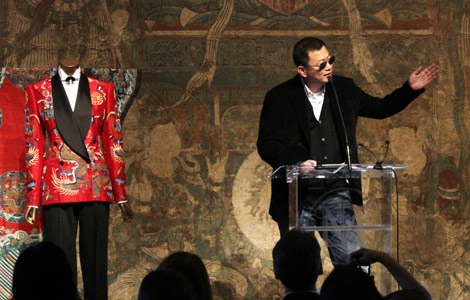Upbeat on US-China relations
Updated: 2015-02-18 11:53
By Amy He in New York(China Daily USA)
|
||||||||
Kevin Rudd, ex-Australian prime minister, sees no leader appetite for risk, let alone war
US and Chinese leaders aren't inclined to risk a conflict, let alone war, said Kevin Rudd, the new president of the Asia Society Policy Institute and former prime minister of Australia.
China watchers may be tempted to focus on headlines about the US-China relationship, but most scholars and leaders from both countries look "well beyond the headlines," he said.
"I've got to know American leaders well over the years; I've got to know Chinese leaders well over the years. I don't see in any of these leaders any predisposition to risk the possibility of conflict, let alone war," Rudd said on Tuesday at the Asia Society, during a media briefing to mark his arrival in New York as the policy institute's first president.
"We shouldn't be too captured by the headlines," he said.
For those concerned with the US pivot to Asia and an increased naval presence in the Asia-Pacific region, Rudd said that even if a larger portion of the US Navy is based there, a higher percentage of a shrinking navy "because of sequestration and the rest, it may not end up being much different than what it is as present," he said.
Rudd, who served as Australia's 26th prime minister from 2007 to 2010, and again in 2013, is the only Western head of state to speak fluent Mandarin.
At the new institute, Rudd said he will focus on evolving the idea of an Asia-Pacific community, "which had a wide membership, which had a wide mandate, which would evolve over time, but with a view to step by step building trust between regional countries".
The think tank, which was launched in April 2014, focuses on Asia-wide research and policy development to help advance security and sustainability across Asia, it says on its website.
On China, Rudd has recently been working on a policy project related to US-China relations for the Kennedy School of Government's Belfer Center at Harvard University, writing about "alternative futures" for the two countries. The project is due in a couple of months.
Rudd commended the two nations on their cooperation, reaching agreements on climate and military matters, the former of which is of particular importance as nations around the world are set to converge in Paris at the end of the year to reach agreements on climate regulation and policy.
"There is a long way to go between that agreement and reaching a comprehensive global agreement in Paris in December, but it represented an enormously positive signal to the international community, because China for the first time announced its peaking year and peaking limit, or the range of its peaking year and peaking limit of total carbon emissions," he said.
"As the two largest emitters in the world, China first, US second, historically, America, huge, and China much less so, this is a very important development," he said.
Rudd also addressed concerns over China's slowing economy, saying that Chinese government officials had chosen to go down the more difficult road of transforming the economy at the cost of slower growth.
"It's been made harder again for China, given they face global markets in a state of not just softness but in fact effective recession and deflation," Rudd said. "Europe has historically been a strong market for China, but Europe really hasn't grown for the last seven or eight years.
"The Chinese leadership is doing pretty well, and there will be lots of bumps in the road," he said. "It will be hard on the way through, but for China's successful economic transformation, I think they're headed in the right direction."
amyhe@chinadailyusa.com
Most Viewed
Editor's Picks

|

|

|

|

|

|
Today's Top News
Upbeat on US-China relations
Metropolitan Museum of Art to focus on China
Reward raised for clues to Chinese family's slaying
New visa policy draws more Chinese tourists
Portland State CI ready for Spring Festival
Students debate the environment
Fireworks on Hudson tonight to usher in Chinese New Year
UN Security Council slams IS murders of 21 Egyptians
US Weekly

|

|















